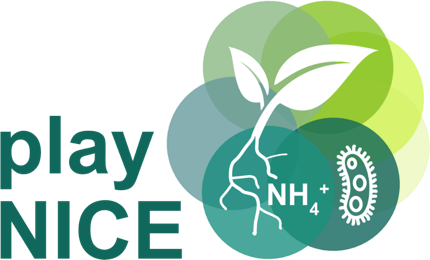Petra Pjevac at the Centre for Microbiology and Environmental Systems Science (CMESS) is leading the “playNICE” project.
Description: The playNICE project aims to identify (novel) Biological Nitrification Inhibitors (BNIs) naturally secreted in the root exudates of common crop plants, evaluate the efficacy and inhibition mechanism of BNIs and their degradation productss, determine the effect of BNIs and their degradation products on soil microbially-mediated biogeochemical processes in soil (nitrification, denitrification, nitrogen fixation) as well as microbial respiration, and microbial carbon use efficiency. Further goals are to determine the mobility, residence time, and degradation products of BNIs and assess the efficacy of BNIs in increasing N retention in soil and N transfer into crops.
Nitrogen (N) is essential for all life on Earth and the most abundant element in the atmosphere, where it mainly occurs as Dinitrogen Gas (N2). However, plants or animals cannot assimilate Dinitrogen Gas into biomass, and the supply of reactive, bioavailable N-compounds often limits ecosystem productivity.
The heavy usage of Nitrogen for fertilization in agriculture has unintended consequences, many of which we have only recently started to grasp. The poor nitrogen use efficiency (NUE) of agriculture leads to massive fertilizer Nitrogen losses to the environment, where it amplifies eutrophication of aquatic ecosystems, and causes changes in atmospheric chemistry and climate. Reducing Nitrogen loss and increasing NUE in agriculture is thus essential to mitigate the negative effects of Nitrogen fertilization. The PlayNICE project aims at a solution for these issues by identifying Biological Nitrification Inhibitors.
Collaborators: Lucia Fuchslueger, Chris Sedlacek, Andrew Giguere (CMESS, University of Vienna), Christoph Bueschl, Maria Doppler (University of Natural Resources and Life Sciences Vienna (BOKU))
Duration: 4 years (01.01.2024 -31.12.2028)
